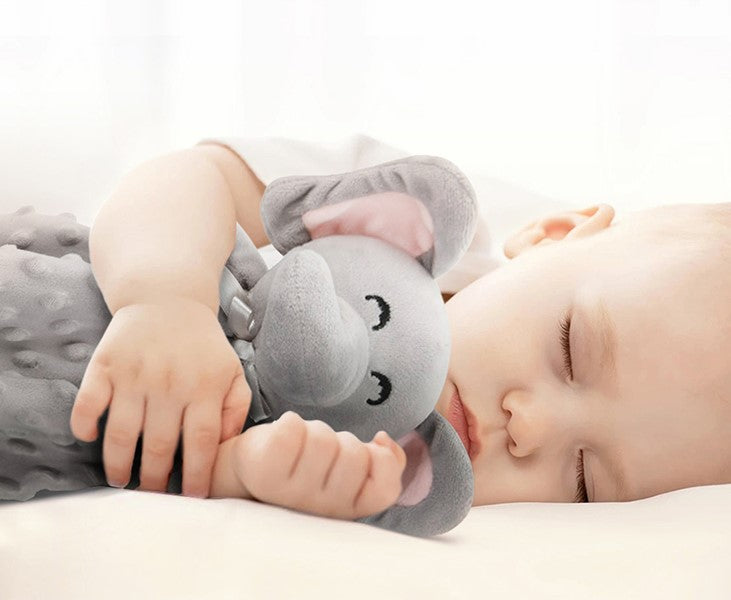كيف أعتني بطفلي

كيف أعتني بطفلي
A Peaceful Sleep for Your Baby: 5 Effective Steps to Establish Healthy Sleep Habits for Infants
by MOHAMMAD HAMDEH on Jan 18 2025
A baby's sleep is one of the most important concerns for parents, as it significantly affects the baby's health, growth, and development. Lack of sleep in infants can cause fatigue for parents and affect the baby's mood and behavior. In this blog post, we will present 5 effective and tried-and-tested steps to establish healthy sleep habits for your baby, helping them sleep better and enjoy a peaceful and comfortable sleep.
The Importance of Good Sleep for Infants
Good sleep is essential for a baby's physical and mental development. During sleep, the body releases growth hormones, tissues are repaired, and memory and learning are enhanced. Good sleep also helps improve the baby's mood and reduce crying and tantrums.
5 Steps to Establish Healthy Sleep Habits for Infants
Follow a Regular Bedtime Routine: Creating a regular bedtime routine helps the baby relax and prepare for sleep. The routine can include:
A warm bath: Helps soothe the baby and relax muscles.
A gentle massage: Enhances physical contact between mother and baby and promotes relaxation.
Dim lighting: Signals to the baby that it's time for sleep.
Reading a quiet story or singing a lullaby: Helps soothe the baby and prepare them for sleep.
Enhance Physical Contact with the Baby: Physical contact between mother and baby, such as cuddling, touching, and massaging, helps release hormones that make the baby feel calm and comfortable, which helps them sleep better.
Exposure to Sunlight During the Day: Exposing the baby to gentle sunlight in the early morning or afternoon helps regulate the baby's biological clock and distinguish between day and night.
Regular Feeding During the Day: Organizing feeding during the day helps reduce the baby's nighttime awakenings for feeding. As the baby grows, nighttime sleep periods can be gradually extended. It is recommended not to wake the baby up for feeding after they reach two months of age, unless otherwise recommended by the doctor.
Observe Sleep Cues: It is important to observe the baby's sleep cues, such as eye rubbing, yawning, crying, or staring at a fixed point. When these signs appear, the baby should be prepared for sleep immediately before they become overtired and find it difficult to fall asleep.
Creating a Comfortable Sleep Environment
In addition to establishing good sleep habits, creating a comfortable sleep environment is crucial for your baby's rest. This includes ensuring the room is dark, quiet, and at a comfortable temperature. A soft and cozy comforter can also play a big role in helping your little one feel secure and snug. We offer a beautiful selection of baby comforters designed for ultimate comfort and safety.
Additional Tips for Better Sleep
Use a suitable crib or bassinet: The crib or bassinet should be safe and comfortable for the baby.
Avoid stimulants before bedtime: Avoid giving the baby any stimulants such as sugars or caffeine before bedtime.
Conclusion:
By following these steps and tips, you will help your baby get a peaceful and comfortable sleep, which contributes to their healthy growth and development. Remember that every baby is unique, and you may need to try some methods to determine what works best for your baby. If you are experiencing sleep problems with your baby, do not hesitate to consult your pediatrician.
Ready to create a cozy sleep haven for your little one? Browse our collection of soft and comfortable baby comforters today!

كيف أعتني بطفلي
How to Trim Your Baby's Nails Without Fear: Practical Tips
by MOHAMMAD HAMDEH on Jan 08 2025
How to Trim Your Baby's Nails Without Fear

كيف أعتني بطفلي
Say Goodbye to Diaper Rash: Effective Tips for Caring for Your Baby's Sensitive Skin
by MOHAMMAD HAMDEH on Dec 03 2024
Effective Tips for Caring for Your Baby's Sensitive Skin

كيف أعتني بطفلي
Common Myths About Newborns: Facts You Should Know
by MOHAMMAD HAMDEH on Aug 13 2024
When a new baby arrives, family and friends often shower new parents with advice and experiences, some of which may be helpful, while others are simply myths and misconceptions that could harm the baby's health. In this blog post, we will shed light on some common myths about newborns and provide proven scientific facts to clarify the picture for new mothers.
Common Myths and Their Corrections
We will now review some common myths about newborn care and correct them with scientific facts:
Myth: Letting a baby cry strengthens their lungs.
Fact: A baby's cry is their only way to express their needs, whether they are hungry, tired, or uncomfortable. Ignoring a baby's cries can cause them frustration and stress and does not strengthen their lungs in any way. It's important to respond to the baby's cries, try to understand the reason for their crying, and soothe them.
Myth: Don't hold the baby too much, or they will get used to being held.
Fact: Holding a baby helps strengthen the bond between mother and child and makes them feel safe and secure. There is no scientific evidence that holding a baby makes them "get used" to being held in a negative way. On the contrary, holding can help soothe the baby, relieve colic, and reduce crying.
Myth: Feed your baby every time they cry.
Fact: Crying is not always a sign of hunger. A baby may cry for other reasons, such as tiredness, needing a diaper change, feeling hot or cold. It's important to observe other signs of hunger, such as sucking on fingers or turning their head searching for the breast. Feeding on demand is important, but it's also important to understand other reasons for a baby's crying.
Myth: The baby's umbilical cord should be cleaned with antiseptic and alcohol.
Fact: Modern umbilical cord care recommends cleaning it with lukewarm water and mild soap and drying it well. Using alcohol and strong antiseptics may delay umbilical cord healing.
Myth: Herbal drinks relieve colic.
Fact: There is no conclusive scientific evidence of the effectiveness of herbal drinks in relieving colic. In some cases, these drinks may cause digestive problems for the baby. It's important to consult a doctor before giving any herbal drinks to an infant.
Myth: Newborns should be bathed daily.
Fact: Newborns do not need to be bathed daily. Bathing two or three times a week is sufficient. Over-bathing can dry out the baby's delicate skin.
Myth: Not all mothers have enough milk for breastfeeding.
Fact: The vast majority of mothers are capable of producing enough milk for breastfeeding. Proper support, healthy nutrition, and frequent breastfeeding help increase milk production.
Myth: Introducing solid foods after 3 months.
Fact: The World Health Organization recommends introducing solid foods after the baby completes six months of age. Introducing solid foods before that may cause digestive problems and allergies for the baby.
Myth: Let your baby sleep in their own room.
Fact: Experts recommend that the baby sleep in the same room as the parents (but not in the same bed) for at least the first six months to reduce the risk of Sudden Infant Death Syndrome (SIDS).
www.peekaboo.ke
Myth: Teething causes fever.
Fact: Teething may cause some discomfort for the baby, such as drooling and gum irritation, but it does not cause fever. If your baby has a fever, it's important to consult a doctor to determine the cause.
Myth: Putting honey on a pacifier helps with teething.
Fact: Honey is not recommended for children under one year of age, as it can cause serious botulism poisoning.
Myth: Baby walkers help them walk earlier.
Fact: Baby walkers do not help them walk earlier; they can delay the development of natural walking skills and increase the risk of accidents.
Conclusion:
It's always important to rely on accurate and reliable information from accredited medical sources when dealing with newborns. Always consult a pediatrician if you have any questions or concerns.



